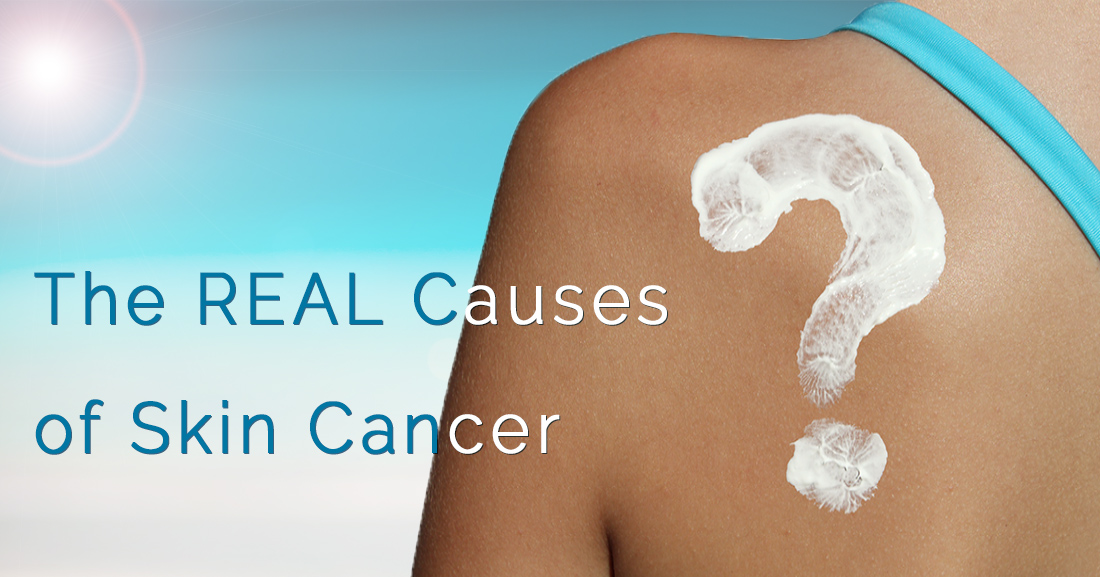
25 Aug The REAL Causes of Skin Cancer
Debunking Sunscreen Myths*
Skin cancer is the most common type of cancer in the United States, with nearly 5 million people treated annually. The 3 most common types of skin cancer are:
- Basal cell carcinomas (80% of all skin cancers)
- Squamous cell carcinomas (generally occurs in the deeper layers of the skin
- Melanoma (less than 2% of all cases of skin cancer)
Mainstream media is obsessed with telling people to avoid the sun and apply copious amounts of sunscreen to prevent skin cancer. But current studies have shown that sunscreen, which has been widely promoted over the last 30+ years, could be doing more harm than good.
According to the U.S. Centers for Disease Control (CDC), skin cancer rates have doubled in the last 30 years. And although the use of sunscreen has also doubled, the CDC, AMA and cancer industry continue to recommend that people avoid the sun and continue using sunscreen, while ignoring the importance of vitamin D and a healthy diet in skin cancer prevention.
Are Sunscreens Really Safe to Use?
Sunscreen blocks vitamin D production, which is an essential nutrient for health and cancer prevention. Many major brands of sunscreen also contain toxic chemicals, which are absorbed through the skin, enter the bloodstream, and then circulate throughout the body.
Cancer-causing chemicals found in sunscreens include:
- Octyl Methoxycinnamate (OMC) – The main chemical used in sunscreens to filter out UVB has been shown to kill mouse cells even at low doses and is particularly toxic when exposed to the sun.
- Titanium Dioxide – Another common ingredient in sunscreens that has been classified as “a potential occupational carcinogen” by the National Institute for Occupational Safety and Health.
- Oxybenzone – This chemical becomes carcinogenic when exposed to the sun and has been found to be a hormone disruptor. The Environmental Working Group (EWG) recommends consumers avoid Oxybenzone, and yet it remains in many major brands of sunscreen.
- Retinol & Retinyl Palmitate (Derivatives of Vitamin A) – AOL News reported that half of the sunscreens tested in a study contained derivatives of vitamin A such as Retinol and Retinyl Palmitate, which have been found to be photocarcinogenic by the FDA, meaning these ingredients become toxic and cancer-causing when exposed to sunlight.
- Diesopropyl Adipate – Since 2006, The National Toxicology Program has reported that Diesopropyl Adipate increased the incidence of tumors in laboratory animals, yet it is still a common ingredient in many sunscreens.
The Importance of Vitamin D
Lifestyle choices and diet play a far more important role than sun exposure when it comes to getting skin cancer. Lack of sunlight means lack of vitamin D, which is a necessary nutrient for the body’s immune system to function properly. Low vitamin D levels are linked to health problems, including cancer. Appropriate sun exposure helps maintain adequate levels of vitamin D. Using sunscreen interferes with that exposure and could be contributing to the rise in skin cancer. The best way to absorb adequate vitamin D is to get natural sunlight and avoid sunscreen, which blocks UVB.
Safe Sun Exposure
The general recommendation is to get 15-30 minutes of direct sunlight every day (darker-skinned individuals may need longer). Start with 10 minutes during the earlier half of the day (before 12:00) and work your way up, ensuring the skin does not get too pink.
If required to be in the sun for extended periods, wearing a hat and extra light clothing is the healthier choice to protect skin from burning rather than using sunscreen. If using sunscreen, be sure to read the label and only use a natural or non-toxic brand.
Zinc Oxide is safe in the sun and is the EWG’s first choice for sun protection. It provides more protection from UVA rays than any other sunscreen chemical approved in the United States. Natural ingredients such as Coconut Oil and Shea Butter are safe in sunscreen and can help nourish and protect the skin.
A Healthy Diet Can Help Avoid Skin Cancer and Sunburn
Eating a healthy diet that is high in antioxidant-rich foods, including berries, apples, beans and dark-leafy greens, and healthy fats also helps prevent sunburn. When solar rays hit the skin, antioxidants come to the surface and act like sunscreen forming a protective shield.
One of the world’s best-known dermatologists, Nicholas Perricone, MD, recommends eating foods that contain natural Astaxanthin, a super antioxidant found in different seafood such as wild Sockeye salmon, shrimp, lobster and red trout. Astaxanthin can also be taken internally as a supplement, which acts as an internal sunscreen for the body, or applied topically to help protect the skin from UV damage.
*Martin, Landee. “Sunscreen and the Lies We’ve Been Told About the Real Causes of Skin Cancer.” thetruthaboutcancer.com.
Accessed 15 Aug. 2020.
